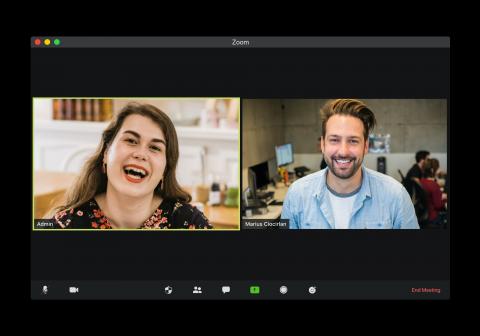A Grad Student’s Guide to Acing Your Remote Interview
As a job candidate, there’s a lot you can’t control about the hiring process. A virtual interview, however, gives you the opportunity to customize your immediate environment and manage how you present yourself.
Your outfit, lighting, background, camera position, and audio quality are just a few things that are worth considering when you’re prepping for your interview.
You may not always be the most qualified candidate or the candidate with the best connections, but you can always be the most prepared. We have the tips and strategies that will give you a competitive edge.
Prep Your Tech 
Try everything out in advance, replicating the setup as closely as possible. This gets your head in the game and limits what can go wrong.
Ideally, you’ll test the exact platform with the computer you’ll be using in the space where you’ll be sitting. You might even rope in a friend or colleague to conduct a mock interview.
Troubleshoot thoroughly. Make sure you’ve got a stable internet connection and are directly plugged into a power source. Consider also testing a second device such as your phone as a backup in case something malfunctions.
Make sure there is nothing distracting on the wall behind you, and try to sit near a window to improve your lighting. Wearing headphones can help reduce echoing. And please, remember to wear appropriate bottoms! You do not want to be known as the candidate who couldn’t bother to put pants on.
Remember, planning out technical considerations ahead of time will give you peace of mind and help you avoid last-minute issues that can throw off your focus.
Do Your Research
The successful job candidate is the one who demonstrates — better than anyone else — that they understood the problem that filling the job will solve, and why they are best suited to solve that problem.
To do this, you need to understand your potential employer as well as you possibly can. Take the initiative to:
- Study their website and press coverage closely.
- Reach out to contacts who understand the institution and the role (but don’t reach out to the actual hiring committee).
- Look up the staff on LinkedIn to get a clear sense of the reporting structure.
Try to put yourself in the hiring committee’s shoes. What questions would you ask prospective candidates? Start with the standard canned questions you can find online and then try to adapt them to the situation of your potential employer. (Hint: a lot of hiring committees do this too!)
Remember: the big question they are asking is not “who most deserves this job,” but “who will help me solve this set of problems?”
Keep in mind that, for all the energy you invest into the interview, this is one of a dozen other things that the hiring committee has on its plate. Everything you do should communicate that you are invested in understanding them and connecting with them.
Perfect Your Professionalism
Every hiring committee will value someone who is professional, poised, attentive, and can think on their feet.
In a remote interview, you can communicate these qualities by:
- Maintaining “eye” contact with the camera (keep any notes near your camera to avoid looking down);
- Eliminating distractions so that you can focus on the questions that are being asked;
- Presenting yourself professionally in the way you dress and in the space you are in;
- Preparing questions of your own to ask the committee; and
- Displaying the self-confidence that comes from being over-prepared.
Expect the Unexpected
There may be more people on the call than you anticipated, the interview may be recorded for distribution without a heads-up, or technical issues on their side could force you to switch platforms or move to a telephone interview.
Remember, any unexpected challenges are also an opportunity to demonstrate your capability and flexibility!
Play the Long Game
During the interview, be as focused on the present moment as possible. However, you should still be conscientious about gathering information for later use.
Whether you move to a second round of interviews, or find another opportunity, you’ll want to be able to synthesize and learn from your experience. What went well? What do you need to learn more about?
We suggest taking notes by hand if you can do it in a quick, legible way, as typing may be loud or distracting. If it’s permitted, consider doing an audio recording of the interview with your phone for reference.
Regardless, you’ll want to get the name of every person on that hiring committee so you can send a follow-up thank you email within 24 hours. You can draft this before the interview, then adapt it according to the conversation. Take a screenshot with everyone’s name during the interview if you can do so discreetly, to be sure you don’t miss anyone.
Ultimately, your highest aspiration isn’t to be the most qualified candidate, but rather to make the impression that you seamlessly fit in and could already be part of the team.
The more natural, professional, and confident you can be during the virtual interview, the more it can feel like a productive weekly Zoom meeting.
Remember, presenting yourself and your work well is a skill that deserves practice. Signing up for our virtual Three Minute Thesis Competition is the perfect opportunity to work on your presentation and public speaking skills.